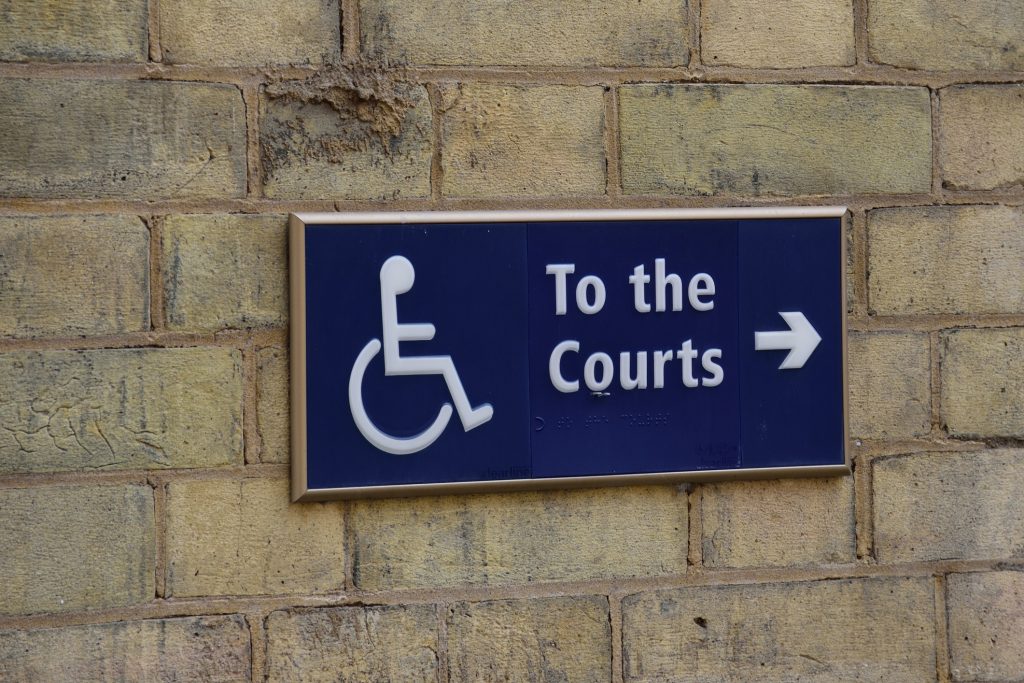Sometimes a trust beneficiary becomes disabled. The trustees propose a trust modification to help protect the beneficiary. Depending on the facts, the trust and the state, the trustee may or may not be able to modify the trust.
George Barrett’s trust
In 1999, when George Barrett was 18, his parents both died in an airplane crash. Their wills created a trust for George and his two younger siblings.
The trust for George Barrett was scheduled to terminate when he turned 35, in 2015. By 2014, he was anxious to get the trust proceeds more quickly. The trustees were unwilling to make earlier distributions, and so George turned to his cousin Bill for help.
Most of the trust assets consisted of stock in a local Alabama bank. Bill agreed to loan George $50,000 immediately, and another $50,000 when he turned 35, in return for the bank stock George expected to receive. They signed an agreement to that effect in August, 2014.
Although the agreement between George and Bill was prepared by an attorney, they both decided not to tell the trustees about it at the time. Bill gave George the first installment on his loan, and both cousins waited for George’s 35th birthday.
The accident
Unfortunately, George was badly injured in an auto accident just three months before he turned 35. As a result, he suffered “significant cognitive and behavioral deficits.” On his actual 35th birthday, he was in an inpatient rehabilitation and behavioral-management facility in Georgia.
Bill wrote to the trustees, sent them a copy of his agreement with George, and requested that they distribute George’s bank stock directly to him. Alternatively, he suggested that they deliver the stock to George, and Bill would turn to him to collect on their agreement.
The trustees declined. They argued that they could only distribute trust assets to Bill if there was a court order. In the meantime, they asked the Alabama courts for a trust modification, which would allow them to keep the stock in trust for George’s benefit past his 35th birthday. The court agreed to modify the trust, at least temporarily, and ordered the trustees to continue to hold the assets in trust for George.
The trust modification proceeding
Bill had not gotten notice of the trust modification in advance. When he learned it had been approved, he intervened in the court action. He argued that he was a necessary party to any trust modification. According to Bill, the court had exceeded its authority by granting the request.
George hired his own attorney. He agreed with the trustees, arguing that the trust should be extended. The trustees also argued that the bank stock itself prohibited the transfer to Bill; George agreed with that position.
The judge ruled that the agreement between George and Bill was invalid because of the bank’s stock transfer rules. He also ordered George to reimburse Bill for the first installment on the loan agreement, plus interest. Bill appealed the decision.
The Alabama Supreme Court
Last week, the state’s highest court overruled the trial judge. The trust modification, ruled the high court, was impermissible — at least as it was done in George’s case.
Alabama, like Arizona, has adopted a version of the Uniform Trust Code. Both laws include a provision permitting trust modification. Sometimes the trustee can modify a trust directly; in some circumstances the trust modification must be approved by a court.
But the modification of George’s trust was not permissible, said the appellate court. Why not? Because it was attempted after George’s 35th birthday. At that point, the trust had already terminated.
The court also cast doubt on the argument that the bank stock transfer was ineffective. The bank’s shareholder agreement permits transfers to those who are “lineal ancestors or descendants” of the current stockholder, and would otherwise prohibit a transfer from George to Bill. Is Bill a “lineal ancestor or descendant” of George’s? It depends on how you read the phrase — does it mean only an individual who is an ancestor or a descendant, or does it include descendants of ancestors? That argument was sent back for another court proceeding. Barrett v. Barrett, September 28, 2018.
What does the Barrett decision mean for others?
Of course, George and Bill’s legal case was decided in Alabama and might not have much meaning for an Arizona trustee or beneficiary. It does, however, point out how important it can be to get good — and timely — legal advice about the availability of trust modification.
Ignoring, for the moment, the fact of George and Bill’s agreement, it is easy to imagine that a trust beneficiary might become disabled. If George’s trustees had acted immediately after his injury, might they have been able to effect a trust modification? Probably yes, if they had been in Arizona. We won’t speculate about Alabama law.
Why would a trustee want to pursue a trust modification after a beneficiary’s injury? It might help protect George from unfortunate decisions he might make as a result of his head injury and cognitive deficits. It might also help him qualify for public benefits assistance — especially Medicaid.
It’s important to note that an Arizona trust beneficiary like George might not actually benefit from a modification of the trust. Each case will be different. That’s exactly why it can make sense, in an appropriate case, to consult with a Tucson elder law attorney.



